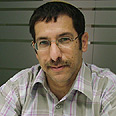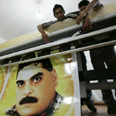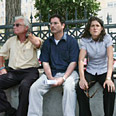
Uri Orbach
Photo: Tomer Barzide

Preparations for Kuntar's return in Lebanon
Photo: Reuters

Regev and Goldwasser families
Photo: AFP
We’ve gathered here today to look them in the eye. We haven’t received their names yet, but we know who those people are more or less and who their relatives and bereaved parents are. They are no different than what we have known so far.
Because if we resort to emotional statements such as “imagine your son was in captivity” and “what would you give to bring your brother back from captivity,” it would only be fair to add to this emotional equation the people who will die, be wounded, and be taken captive in the future.
Their only shortcoming is that they have no names yet. The next people to die will be killed by the senior terrorist who will be freed in the Gilad Shalit swap; or alternately, the abduction of the next soldier will be masterminded by the terrorist freed in the upcoming deal.
The names of the murderers are already known; it’s only the names of the victims that haven’t been received yet.
The miserable parents of future abducted soldiers are reading the headlines now and probably saying that we must do everything in order to secure the abducted soldier’s release and bring the boys home. They are right, of course, but they do not mean that we should indeed be doing everything.
For example, if the Palestinian prisoner to be freed in such deal is the one who will build the explosive belt that will explode on a bus and kill their son in October 2011, they may have a different view. If those parents, whose names the public doesn’t know just yet, could read the newspapers of the future, they would see headlines such as “we waited for this child for 14 years, and now we’re left with nothing.” Perhaps under those circumstances they would not be backing the deal today.
Balanced demagoguery
I don’t really know what’s the right thing to do. There are certainly arguments for both sides. At this time we are dealing with the fate of Gilad Shalit, one precious soldier, whose name and photo we know. At this time we see his good and brave parents. At this time we also see the relatives of Eldad Regev and Udi Goldwasser. Perhaps this is the right decision then, because we know them, and it is urgent and essential to bring the boys back, while the future is still in the future, and who knows what will be happening by then.But if we’re going wild with emotions, and if we come up with the “bring them back at any price” arguments, it would be good to know what that price really is, and use the same emotional elements when dealing with the future as well. Because if we’re going with demagoguery, at least make it balanced.
Yet the best thing to do, Mr. Prime Minister, is to weigh the issue, take calculated risks, and use your brains – and not only the emotions. Because those who take decisions only after spending the whole day looking in the eyes of relatives and meeting the families would do well to also look in the eye of those who will die in the future; even if they’re nameless.















